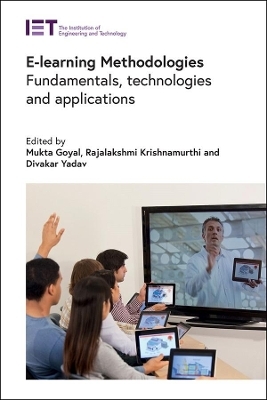
E-learning Methodologies
Institution of Engineering and Technology (Verlag)
978-1-83953-120-0 (ISBN)
E-learning has become an important part of our educational life with the development of e-learning systems and platforms and the need for online and remote learning. ICT and computational intelligence techniques are being used to design more intelligent and adaptive systems. However, the art of designing good real-time e-learning systems is difficult as different aspects of learning need to be considered including challenges such as learning rates, involvement, knowledge, qualifications, as well as networking and security issues. The earlier concepts of standalone integrated virtual e-learning systems have been greatly enhanced with emerging technologies such as cloud computing, mobile computing, big data, Internet of Things (IoT), AI and machine learning, and AR/VT technologies.
With this book, the editors and authors wish to help researchers, scholars, professionals, lecturers, instructors, developers, and designers understand the fundamental concepts, challenges, methodologies and technologies for the design of performant and reliable intelligent and adaptive real time e-learning systems and platforms. This edited volume covers state of the art topics including user modeling for e-learning systems and cloud, IOT, and mobile-based frameworks. It also considers security challenges and ethical conduct using Blockchain technology.
Mukta Goyal is an Assistant Professor in the Department of Computer Science and Engineering, Jaypee Institute of Information Technology, Noida, India. She attained her doctorate in the domain of Soft Computing from Jaypee Institute of Information Technology, Noida. She has over 20 years of teaching experience at both undergraduate and postgraduate levels. Mukta has organized special sessions in conferences and is in the program committee of various conferences of repute. She has many national and international research publications to her credit. She is an active researcher in the field of soft computing, e-learning, e-governance, blockchain, and machine learning. She has guided various M.Tech. theses, more than 100 B.Tech. projects. Presently, she is guiding three Ph.D. scholars. Rajalakshmi Krishnamurthi is currently working as an Assistant Professor (Senior Grade) in the Department of Computer Science and Engineering at Jaypee Institute of Information Technology, Noida, India. She is a senior member of IEEE, a professional member of ACM, SIAM, and CSI. She is currently serving as a treasurer, Delhi ACM-W chapter. She has over 17 years of teaching experience both at undergraduate and postgraduate levels. She has more than 50 research publications in various reputed international journals, book chapters, and international conferences. She is serving as a guest editor in Springer Nature. Her research interest includes Internet of Things, cloud computing, mobile computing, and e-learning. She has introduced and developed several courses at B.Tech and M.Tech levels. She has refereed in reputed journals like IEEE, IoT, wireless networks, peer-to-peer Springer. She has been a technical program member in several international conferences. Currently, she is supervising two Ph.D. scholars and one Ph.D. completed. She has supervised more than 14 M.Tech theses and 100 B.Tech major projects. Divakar Yadav is currently working as an Associate Professor in the Department of Computer Science and Engineering at National Institute of Technology, Hamirpur (HP), India. Prior to joining this institute, he had worked at Madan Mohan Malaviya University of Technology, Gorakhpur (UP), India as an Associate Professor and Jaypee Institute of Information Technology, Noida, India as an Assistant as well as an Associate Professor. He did his undergraduate degree (B.Tech) in Computer Science and Engineering in 1999 from IET, Lucknow, postgraduate degree (M.Tech) in Information Technology in 2005 from Indian Institute of Information Technology, Allahabad and Ph.D. in Computer Science and Engineering in 2010 from Jaypee Institute of Information Technology, Noida. He also worked as a post-doctoral fellow at the University of Carlos III, Madrid, Spain between 2011 and 2012. He supervised four Ph.D. theses, 22 M.Tech dissertations, and many undergraduate projects. He also published more than 85 research articles in reputed international journals and conference proceedings. His area of research includes information retrieval and machine learning. He is a senior member of IEEE.
Part I: Introduction and pedagogies of e-learning systems with intelligent techniques
Chapter 1: Introduction
Chapter 2: Goal-oriented adaptive e-learning
Chapter 3: Predicting students' behavioural engagement in microlearning using learning analytics model
Chapter 4: Student performance prediction for adaptive e-learning systems
Part II: Technologies in e-learning
Chapter 5: AI in e-learning
Chapter 6: Mobile learning as the future of e-learning
Chapter 7: Smart e-learning transition using big data: perspectives and opportunities
Chapter 8: E-learning using big data and cloud computing
Chapter 9: E-learning through virtual laboratory environment: developing of IoT workshop course based on Node-RED
Chapter 10: Mnemonics in e-learning using augmented reality
Chapter 11: E-learning tools and smart campus: boon or bane during COVID-19
Part III: Case studies
Chapter 12: Bioinformatics algorithms: course, teaching pedagogy and assessment
Chapter 13: Active learning in E-learning: a case study to teach elliptic curve cryptosystem, its fast computational algorithms and authentication protocols for resource constraint RFID-sensor integrated mobile devices
Chapter 14: Conclusion
| Erscheinungsdatum | 08.04.2021 |
|---|---|
| Reihe/Serie | Computing and Networks |
| Verlagsort | Stevenage |
| Sprache | englisch |
| Maße | 156 x 234 mm |
| Themenwelt | Schulbuch / Wörterbuch ► Unterrichtsvorbereitung ► Unterrichts-Handreichungen |
| Sozialwissenschaften ► Pädagogik | |
| Technik ► Nachrichtentechnik | |
| ISBN-10 | 1-83953-120-7 / 1839531207 |
| ISBN-13 | 978-1-83953-120-0 / 9781839531200 |
| Zustand | Neuware |
| Haben Sie eine Frage zum Produkt? |
aus dem Bereich


